小学英语一般过去时讲义(1)
一般过去时(讲义)-人教PEP版英语六年级下册
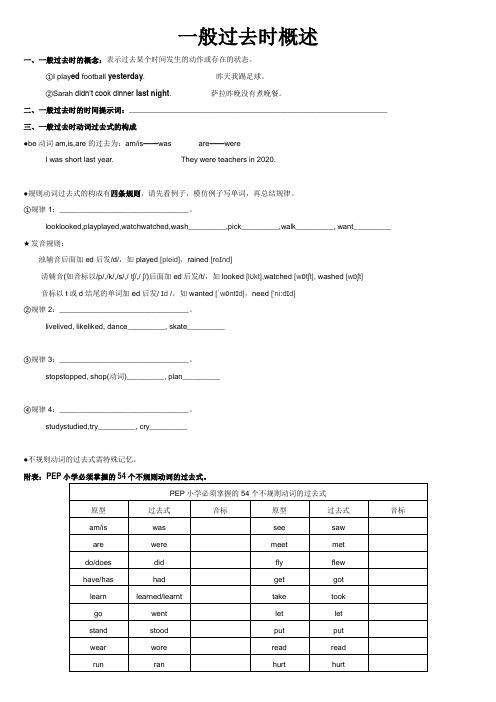
一般过去时概述一、一般过去时的概念:表示过去某个时间发生的动作或存在的状态。
①I play ed football yesterday. 昨天我踢足球。
②Sarah didn’t cook dinner last night. 萨拉昨晚没有煮晚餐。
二、一般过去时的时间提示词:______________________________________________________________三、一般过去时动词过去式的构成●be动词am,is,are的过去为:am/is——was are——wereI was short last year. They were teachers in 2020.●规则动词过去式的构成有四条规则,请先看例子,模仿例子写单词,再总结规律。
①规律1:_______________________________。
looklooked,playplayed,watchwatched,wash_________,pick_________,walk_________, want_________ ★发音规则:浊辅音后面加ed后发/d/,如played [pleid],rained [reɪnd]清辅音(如音标以/p/,/k/,/s/,/ tʃ/,/ʃ/)后面加ed后发/t/,如looked [lʊkt],watched [wɒtʃt], washed [wɒʃt]音标以t或d结尾的单词加ed后发/ɪd /,如wanted [ˈwɒntɪd],need ['ni:dɪd]②规律2:_______________________________。
livelived, likeliked, dance_________, skate_________③规律3:_______________________________。
stopstopped, shop(动词)_________, plan_________④规律4:_______________________________。
(完整)小学英语语法时态一般过去时详解
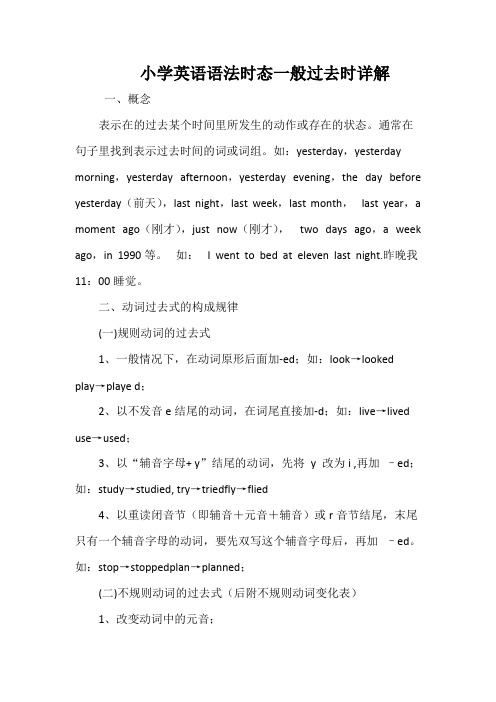
小学英语语法时态一般过去时详解一、概念表示在的过去某个时间里所发生的动作或存在的状态。
通常在句子里找到表示过去时间的词或词组。
如:yesterday,yesterday morning,yesterday afternoon,yesterday evening,the day before yesterday(前天),last night,last week,last month,last year,a moment ago(刚才),just now(刚才),two days ago,a week ago,in 1990等。
如:I went to bed at eleven last night.昨晚我11:00睡觉。
二、动词过去式的构成规律(一)规则动词的过去式1、一般情况下,在动词原形后面加-ed;如:look→looked play→playe d;2、以不发音e结尾的动词,在词尾直接加-d;如:live→lived use→used;3、以“辅音字母+ y”结尾的动词,先将y 改为i ,再加–ed;如:study→studied, try→triedfly→flied4、以重读闭音节(即辅音+元音+辅音)或r音节结尾,末尾只有一个辅音字母的动词,要先双写这个辅音字母后,再加–ed。
如:stop→stoppedplan→planned;(二)不规则动词的过去式(后附不规则动词变化表)1、改变动词中的元音;begin→began drink→drank come→came eat→ate grow→grew run→ran know→knew win→wonspeak→spoketake→took write→wrote get→got2、变词尾的–d 为–t ;build→built lend→lent send→sent spend→spent bend→bent3、与动词原形一样;cut→cut put→put cost→cost hurt→hurt shut→shut4、变-ay 为-aid (少数动词);say→said pay→paid lay→laid5、采用不同词根;sell→sold teach→taught buy→bought6、其他。
小学英语一般过去时态讲解及习题ppt课件
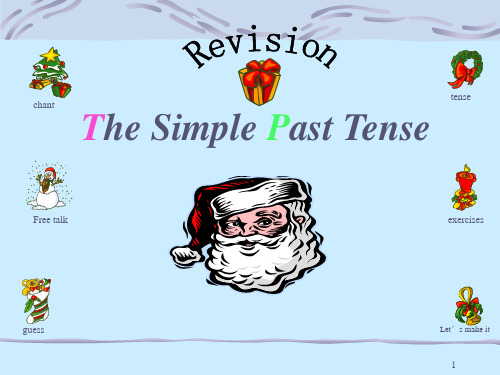
A: What day_i_s_ it today ? B: It _is_ Sunday. A: What day _w_a_s_it yesterday?B: It_w_a_s_Saturday. A: What day _w_a_s_ it the day before yesterday ?
39
It was sunny.
The vacations were great .
How was the weather ? How were the vacations ?
I did my homework yesterday.
What did you …do…?
She played soccer last Sunday.
Did they have…?
My father went to the beach three years ago.
Did your father go…?
Tom and Jack studied for the test three days
ago. Did Tom and Jack study…?
I did my homework yesterday.
Did you do…?
Sshe play…?
He cleaned his room last week.
Did he clean…?
They had a summer camp last weekend.
What did she …do…?
30
Exercise 1. _W_e_r_e_(be) you busy yesterday afternoon? 2. She _w__a_s _ (be) at school this morning. 3. Jane and Ann w__er_e_n_’(tbe not) friends before. 4. He _d_i_d_n_’(tdo not) live in Guangzhou
【提优拔尖】小学英语五升六暑假讲义专题三 ---- 一般过去时(一)
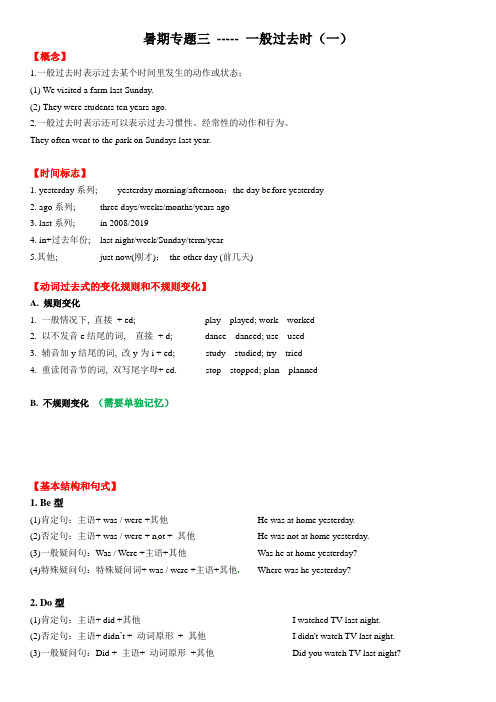
暑期专题三----- 一般过去时(一)【概念】1.一般过去时表示过去某个时间里发生的动作或状态;(1) We visited a farm last Sunday.(2) They were students ten years ago.2.一般过去时表示还可以表示过去习惯性、经常性的动作和行为。
They often went to the park on Sundays last year.【时间标志】1. yesterday系列; yesterday morning/afternoon;the day be fore yesterday2. ago系列; three days/weeks/months/years ago3. last系列; in 2008/20194. in+过去年份; last night/week/Sunday/term/year5.其他; just now(刚才);the other day (前几天)【动词过去式的变化规则和不规则变化】A. 规则变化1. 一般情况下, 直接+ ed; play---played; work---worked2. 以不发音e结尾的词, 直接+ d; dance---danced; use---used3. 辅音加y结尾的词, 改y为i + ed; study---studied; try---tried4. 重读闭音节的词, 双写尾字母+ ed. stop---stopped; plan---plannedB. 不规则变化(需要单独记忆)【基本结构和句式】1. Be型(1)肯定句:主语+ was / were +其他He was at home yesterday.(2)否定句:主语+ was / were + n ot + 其他He was not at home yesterday.(3)一般疑问句:Was / Were +主语+其他Was he at home yesterday?(4)特殊疑问句:特殊疑问词+ was / were +主语+其他Where was he yesterday?2. Do型(1)肯定句:主语+ did +其他I watched TV last night.(2)否定句:主语+ didn’t + 动词原形+ 其他I didn't watch TV last night.(3)一般疑问句:Did + 主语+ 动词原形+其他Did you watch TV last night?(4)特殊疑问句:特殊疑问词+ did + 主语+动词原形+其他What did you do last night?一般过去时专项练习一、写出下列动词的过去式1.am/is ______2. cry________3. read ________4. watch ________5. live _________6. take ________7. spend________8. drink_________9. fly________ 10.ride _______ 11.live _________ 12. give________13. do _______ 14. go ________ 15. have _______ 16 .cook_______17. cut ________ 18. clean _______ 19. think _______ 20. study_________二、用括号内所给词的适当形式填空1. We _________ (enjoy) ourselves at the party last night.2. The teacher told us that the moon_____(travel) around the earth.3. _______ you ______ (go) to the Great Wall last year?4. The old man _______(be)ill and went to see a doctor.5. We ________ (have) a party next Sunday.6. They _________(play) the guitar now.7. Did she ________ (have) supper at home?8. Jack ____________ (not clean) the room just now.9. _________ (be) it cold in your city yesterday?10. How many people ________ (be) there in your class last term?11. It ________ (be) hot yesterday and most children _______ (be) outside.12. There ________ (be) a football match on TV yesterday evening, but I _________ (have) no time to watch it.13. He ate some bread and _________ (drink) some milk.14. ________ he __________ (finish) his homewo rk last night?15. I__________(be) tired yesterday.16. I ___________(gain ) Arts degree last year.17. What _________ you ___________ (do) last night?18. My grandfather _________ (leave) Hong Kong for New York in 1998.19. What _______ he ________ (do) yesterday?20. Last week I _______ (buy) a new bike.21. He ________ (be) here just now.22. He __________ (not find ) his key last night.24. My father __________ (drink) a lot of wine yesterday.24. ________ you ________ (finish) your homework yesterday?25. Her mother __________ (not give) the girl any present.三、句型转换1. He came here last month. (改为否定句)He ______ ________ here last month.2. They played football this morning. (改为一般疑问句并作简略回答)—______ they _______ football this morning?—Yes, they _______./No, they _________ .3. They went to Beijing last year. (就划线部分提问)_________ _________ they ________ last year.4. Tom watched TV last night. (改为一般疑问句)_______ Tom _______ TV last night?5. Mary does homework every day. (用last night 改写句子)Mary ______ ________ ________ __________ .6. My family went to the beach last week. (划线提问)________ ________ ________ family _______ last week?7. I didn’t hav e any friends. (一般疑问句)________ _______ have _______ friends?8. She had many books in the room. (一般疑问句)________ she _________ many books in the room?9. Sally often did some reading in the morning. (否定句)Sally _______ often ______ some reading in the morning.10. She read some books in the room. (否定句)She __________ __________ ________ books in the room.四、改错题1. How is Jane yesterday? _______________________2. He go to school by bus last week. _______________________3. He often goes home at 6:00 last month. _______________________4. I can fly kites seven years ago. _______________________5. Did you saw him just now. _______________________6. Tom wasn’t watch TV last night. _______________________7. I didn’t my homework yesterday. _______________________8. He wait for you three hours ago. _______________________9. Who find it just now ? _______________________10. What did he last week? _______________________五、选择填空( ) 1. Lee ________ his mobile phone at home.A. leaveB. leavesC. leavedD. left( ) 2. _____ he ________ a good rest? No, he didn’t.A. Do, hadB. Did, haveC. Did, hadD. Was, had( ) 3. As soon as he ________, he ______ to his family.A. arrived, writesB. arrived, writtenC. arrive d, wroteD. arriveds, write ( ) 4. Mr. Black was late because he _______ his way.A. lostedB. loseC. losesD. lost( ) 5. When _________ Lee ________ school this morning?A. did, got toB. did, get toC. did, getD. did, got( ) 6. Will you please say it again? I ________ quite _______ you.A. didn’t, hearB. don’t, heardC. didn’t, heardD. don’t, hear ( ) 7. ______ you ________ at six o’clock yesterday?A. Do ,get upB. Did, get upC. Do, got upD. Did, got up( ) 8.What did you see _________?A. nowB. every dayC. these daysD. just now( ) 9.He went into the room and _______ the door.A. lockB. lockingC. locksD. locked( ) 10. —What _____ you _______ last week? —I bought a bag.A. did ,buyB. did , boughtC. do, buyD. do, bought( ) 11. —_____ he ____ his lunch? — Yes, he did.A. Does ,hasB. Does, haveC. Did, haveD. Did, had( )12.—Did the thieves _____ into the car? —No, they______.A. fell, didn’tB. fall(落下), didC. jump(跳), didn’tD. jump, did ( ) 13. -When did May come back from Hong Kong? -She __ from Hong Kong last Friday. A. come back B. comes back C. returned back D. came back ( ) 14. ____ she _____ this dictionary in the bookshop nearby last week?A. Did, buyB. Does, buyC. Did, boughtD. Does, buys ( ) 15. He ____ to the station this morning and was______ for the train.A. hurry, in timeB. hurries, on timeC. hurried, in timeD. hurried, at time ( ) 16. Where _____ Uncle Sun yesterday?A. wasB. wereC. didD. does ( ) 17. —Have you seen him today? —Yes, I ____ him this morning.A. seeingB. seeC. seesD. saw( ) 18. He ______ worried when he heard the news.A. isB. wasC. doesD. did( ) 19. There _____ a telephone call for my brother Steven yesterday?A. isB. areC. wasD. were( ) 20. Liu Fengwei _____ three yuan for the lost library book.A. paidB. payC. spentD. lost( ) 21. He ____ in this school in 1958.A. taughtB. teachC. teachesD. teaching( ) 22. They _____ tired so they stopped ____ a rest.A. are, haveB. were, haveC. were, to haveD. are, hav ing( ) 23. Yesterday I _____ in bed all day because I had a fever.A. layB. lieC. laidD. lied( ) 24. It was raining hard when he ____ home.A. gotB. getC. getsD. was getting( ) 25. She said her brother ____ in Beijing. He ______ to Japan on business last week.A. wasn’t, wentB. hasn’t, wentC. wasn’t, goD. isn’t, went一般过去时专项练习答案一、写出下列动词的过去式(略)二、用括号内所给词的适当形式填空1. enjoyed2. travels3. Did; go4. was5. will have6. are playing7. have8. didn’t clean9. Was 10. were11. was; were 12. was; had 13. drank 14. Did finish 15. was16. gained 17. did do 18. left 19. did do 20. bought21. was 22. didn’t find 24. drank 24.Did finish 25. didn’t give三、句型转换1. didn’t come2. Did play ; did; didn’t3. Where did go4. Did watch5. did homework last night6. Where did your go7. Didn’t you have8. Did have9. didn’t do 10. didn’t read any四、改错题1. is --- was2. go ---- went3. goes---- went4. can ---- could5. saw---- see6. wasn’t ---- didn’t7. didn’t --- didn’t do8. wait --- waited9. find --- found 10. he ---- he do五、选择填空DBCDB ABDDA CCDAC ADBCA ACAAA。
六年级英语动词时态之一般过去时讲义
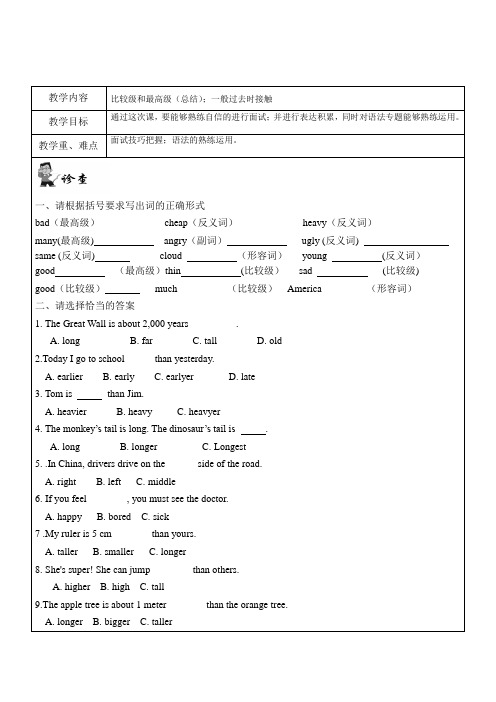
教学内容比较级和最高级(总结);一般过去时接触教学目标通过这次课,要能够熟练自信的进行面试;并进行表达积累,同时对语法专题能够熟练运用。
教学重、难点面试技巧把握;语法的熟练运用。
一、请根据括号要求写出词的正确形式bad(最高级)__________ cheap(反义词)__________ heavy(反义词)__________ many(最高级) angry(副词)ugly (反义词)same (反义词) cloud (形容词)young (反义词)good (最高级)thin (比较级)sad (比较级)good(比较级)much_________ (比较级)America_________(形容词)二、请选择恰当的答案1. The Great Wall is about 2,000 years _________.A. longB. farC. tallD. old2.Today I go to school _____ than yesterday.A. earlierB. earlyC. earlyerD. late3. Tom is than Jim.A. heavierB. heavyC. heavyer4. The monkey’s tail is long. The dinosaur’s tail is .A. longB. longerC. Longest5. .In China, drivers drive on the ______side of the road.A. rightB. leftC. middle6. If you feel________, you must see the doctor.A. happyB. boredC. sick7 .My ruler is 5 cm________than yours.A. tallerB. smallerC. longer8. She's super! She can jump ________than others.A. higherB. highC. tall9.The apple tree is about 1 meter _______ than the orange tree.A. longerB. biggerC. taller12.Can you speak English ?Yes ,but only a (一点)。
小学英语时态之 一般过去时讲解课件ppt

一般过去时:
定义: 一般过去时,是表示过去某一时刻或某一段时间内发生的动作或存在
的状态。
标志词: yesterday, just now, …ago, last…, this morning …
结构: 谓语是be动词
谓语是行为动词
肯定句: 主语+ was/were + 其他 否定句: 主语+ was/were + not + 其他 一般疑问句: Was/Were + 主语+其他? 肯定句: 主语+ 动词的过去式 + 其他 否定句: 主语+ didn’t +动词原形 + 其他 一般疑问句:Did + 主语+ 动词原形 +其他?
at the weekends this morning often
usually
last Mid-Autumn Festival
every day three days ago on Mondays
tomorrow a moment ago 14 years ago
找出表示一般过去时的时间副词。
( B) 1. My mother had breakfast and____to work.
A. go B. went C. going D. to go
( A)2. -- How __ your vacation?
-- It was pretty good. A. was B. were C. did D. do
( )3.Each student one picture.
A.draw B. draws C. drawing D.to drawing
一般现在时及一般过去时讲义

一般现在时与一般过去时讲义一、一般现在时【No. 1】一般现在时的功能1.表示事物或人物的特征、状态。
如:The sky is blue.天空是蓝色的。
2.表示经常性或习惯性的动作。
如:I get up at six every day.我天天六点起床。
标志性词语:always (一直,总是) often (常常) usually (通常) sometimes(有时) everyday/week/month/year/morning/afternoon/evening/night...3.表示客观现实。
如:The earth goes around the sun.地球绕着太阳转。
【No. 2】一般现在时的构成1. be动词:主语+be(am,is,are) +其它。
如:I am a boy.我是一个男孩。
2.实义动词:主语+实义动词+其它。
如:We study English.我们学习英语。
【注】当主语为第三人称单数(he, she,it)时,要在动词后加"-s"或"-es"。
如:Mary likes Chinese.玛丽喜欢汉语。
【No. 3】一般现在时的变化1.be动词的变化1)否定句:主语be+not +其它。
如:He is not a worker.他不是工人。
2)一般疑问句:Be+主语+其它。
如:-Are you a student? -Yes. I am. / No, I'm not.3)特殊疑问句:疑问词+一般疑问句。
如:Where is my bike?2. 实义动词的变化1)否定句:主语+don't( doesn't ) +动词原形( 其它)。
如:I don't like bread.当主语为第三人称单数时,要用doesn't构成否定句。
如:He doesn't often play.2)一般疑问句:Do( Does ) +主语+动词原形+其它。
六年级上册英语-一般过去时讲义知识点 练习 沪教牛津版

一般过去时概念:一般过去时表示过去某个时间发生的动作或存在的状态,常和表示过去的时间状语连用。
一般过去时也表示过去经常或反复发生的动作。
重点:一般过去时态概念、用法及动词过去式变化规则难点:一般过去时的句子如何变为一般疑问句和特殊疑问句Be动词的一般过去时态变化⑴am 和is在一般过去时中变为was。
(was not=wasn’t)⑵are在一般过去时中变为were。
(were not=weren’t)⑶带有was或were的句子,其否定、疑问的变化和is, am, are一样,即否定句在was或were 后加not,一般疑问句把was或were调到句首。
句中没有be动词的一般过去时的句子肯定句:动词用一般过去时态,如:Jim went home yesterday.否定句:didn’t +动词原形,如:Jim didn’t go home yesterday.一般疑问句:在句首加did,句子中的动词过去式变回原形。
如:Did Jim go home yesterday?特殊疑问句:(1)疑问词+did+主语+动词原形?如:What did Jim do yesterday?Where did Jim go yesterday?⑵疑问词当主语时:疑问词+动词过去式?如:Who went home yesterday?动词过去式变化规则1.一般在动词末尾加-ed,如:pull-pulled, cook-cooked2.以e结尾的动词,直接加-d,如:taste-tasted3.以重读闭音节(即:辅音+元音+辅音)结尾且末尾只有一个元音字母和一个辅音字母的动词,双写末尾的辅音字母,再加-ed,如:stop-stopped4.以“辅音字母+y”结尾的,变y为i,再加-ed,如:study-studied5.不规则动词过去式:am,is-was,are-were, do-did, see-saw, say-said, give-gave,get-got, go-went, come-came, have-had, eat-ate,take-took, run-ran, sing-sang, put-put, make-made,read-read, write-wrote, draw-drew, drink-drank, fly-flew, ride-rode, speak-spoke, sweep-swept, swim-swam, sit-sat一.过去时练习。
英语语法——一般过去时课件(共44张PPT)

肯否回答:
一般疑问句: Be动词(was/were)+主语+其他+?
肯定回答:Yes , 主语+ was/were. 否定回答:No , 主语+ wasn’t/weren’t . --- Was he at home yesterday ? ---他昨天在家吗? --- Yes , he was .是的,他在 --- No , he wasn’t . 不,他不在。
study — studied
carry— carried
5.不规则变化. (见不规则动词表P97)
be动词 的一般过去时
Please look at the sentences
我今年12岁. I _a_m_ 12 years old this year.
我去年11岁. I _w_a_s_ 11 years old last year.
实意动词的一般 过去时句子结构
每天,早餐我吃鸡蛋和牛奶。 I _h_av_e_ eggs and milk for breakfast every morning.
昨天,早餐我吃面条。
I _h_a_d_ noodles for breakfast yesterday morning.
他每天都吃水果。 He _h_a_s__ fruit every day.
1. I _______ at school now.
was 2. He ________ at the camp last week. were 3. We ________ students two years ago. were 4. They ________ on the farm a moment ago. was 5. Yang Ling ________ eleven years old last year. was 6. There ________ an apple on the plate yesterday. was 7. There ________ some milk in the fridge yesterday. was 8. The mobile phone _______ on the sofa yesterday evening.
小学英语一般过去时态

一般过去时(PEP Book 8 Unit 3 Last Week / Unit 4 My Holidays)Hello, boys and girls! 今天我们讲一般过去时,分三个方面讲述,大家可要认真听哟!I. 一般过去时的概念一般过去时表示过去某个时间发生的动作或存在的状态。
常和表示过去的时间状语连用。
如:last year, yesterday等;也可表示过去经常反复发生的动作,常和often, always等频率副词连用。
例如:①I saw him in the street yesterday. 昨天我在街上看见他了。
②Li Mei always went to school on foot last year. 去年李梅总是步行上学。
II. 一般过去时的构成动词过去式的构成:(1)规则动词过去式的构成有四条规则:①一般在动词原形末尾直接加上-ed。
如:look-looked。
②以不发音的字母e结尾的动词,去e再加-ed。
如:live-lived。
③末尾只有一个辅音字母的重读闭音节,先双写这个辅音字母,再加-ed。
如:stop-stopped。
④末尾是辅音字母+y结尾的动词,先变y为i,然后再加-ed。
如:study-studied。
(2)不规则动词的过去式需特殊记忆。
如:am(is)-was, are-were, go-went, come-came, take-took, have (has)-had等。
III. 一般过去时的几种句型肯定句结构为:主语+动词的过去式+其它。
如:He went to the toy store yesterday. 他昨天去玩具店了。
否定句结构为:主语+did not (didn't)+动词原形+其它。
如:He didn't go to the toy store yesterday. 他昨天没去玩具店。
一般过去时的一般疑问句的构成:Did+主语+动词原形+其它?如:1) -Did you go to Beijing last week?-Yes, we did. (No, we didn't.)2) -Did you meet the businessman before?-No, I didn't. (Yes, I did.)一般过去时的特殊疑问句的构成:疑问词+did+主语+动词原形+其它?如:1) -What did you do last night?-I did my homework.2) -Where did you go last week?-I went to Shanghai with my parents.一般过去时口诀一般过去时并不难,表示过去动作、状态记心间。
小学英语语法详解时态-----一般过去时
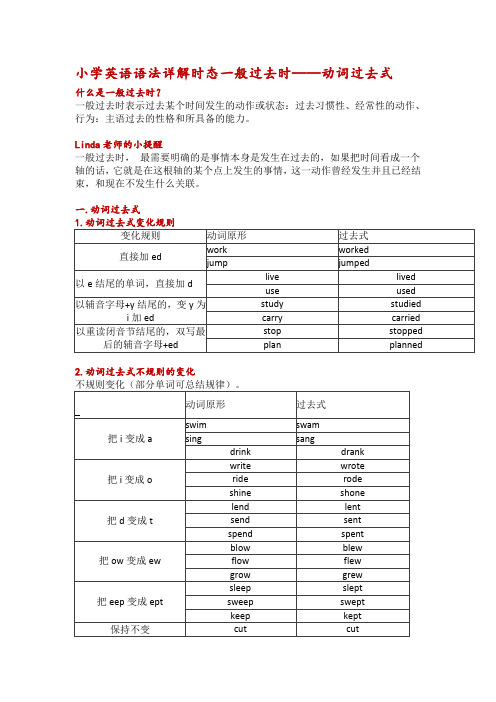
小学英语语法详解时态一般过去时——动词过去式什么是一般过去时?一般过去时表示过去某个时间发生的动作或状态:过去习惯性、经常性的动作、行为:主语过去的性格和所具备的能力。
Linda老师的小提醒一般过去时,最需要明确的是事情本身是发生在过去的,如果把时间看成一个轴的话,它就是在这根轴的某个点上发生的事情,这一动作曾经发生并且已经结束,和现在不发生什么关联。
一.动词过去式2.动词过去式不规则的变化Linda老师的小提醒★大部分过去式还是需要去记忆的:be动词的过去式一was(am,is的过去式). were(are的过去式)。
一些实义动词的过去式,dig→ dug,run→ ran,eat→ ate,fall→ fell,lie→ lay等。
★部分动词的过去式两种都是可以的,比如:lean→ leaned/leant;dream→ dreamt/dreamed;bet→ bet/betted等。
小学英语语法详解时态一般过去时——一般过去时的句式变化二.一般过去时的句式变化1.陈述句:主语+动词过去式+其他I saw the rianbow yesterday.我昨天看到了彩虹。
They went to he park last Sunday.上周日他们去了公园。
Ben got up at six this morning.本今天早上是六点起床的。
2.一般疑问句1)将be动词提到句首陈述句:It was an egg yesterday.它昨天还是一个蛋。
一般疑问句:Was it an egg yesterday?它昨天还是一个蛋吗?陈述句:They were at school just now.他们刚才还在学校。
一般疑问句:Were they at school just now?他们刚才还在学校吗?Linda老师的小提醒主语是第一人称和第二人称的句子,其过去时变化时,要注意be动词的变化。
一般疑问句:Were you at home last night?你昨天晚上在家吗?肯定回答:Yes,I was.否定回答:No,I wasn't.2)用助动词did陈述句:I did my homework at school,我在学校做了作业。
六年级上册英语讲义-unit1 Growing up习题精讲 知识拓展 巩固提高(有答案) 沪教牛津版
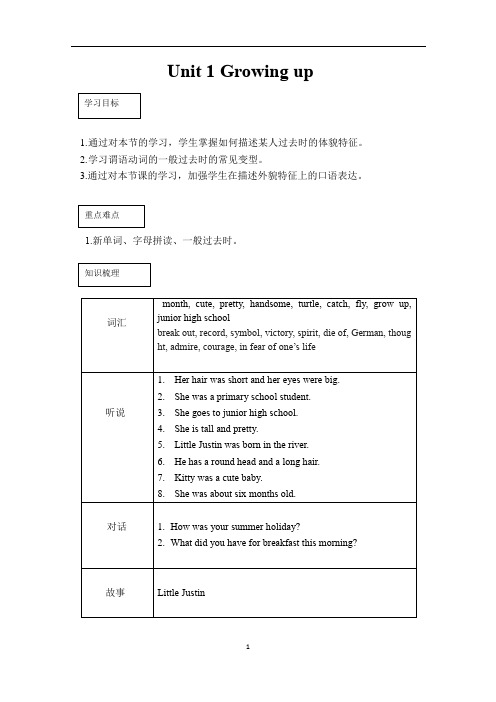
Unit 1 Growing up1.通过对本节的学习,学生掌握如何描述某人过去时的体貌特征。
2.学习谓语动词的一般过去时的常见变型。
3.通过对本节课的学习,加强学生在描述外貌特征上的口语表达。
1.新单词、字母拼读、一般过去时。
n. 月份1. month英[mʌnθ]美[mʌnθ]【例句】I was about six months old.【互动】【象形记忆法】adj. 可爱的2.cute 英[kju:t] 美[kjut]【例句】You were a cute baby.【互动】【象形记忆法】adj. 漂亮的3.pretty 英[ˈprɪti] 美[ˈprɪti]【例句】kate is a pretty girl.【互动】 【象形记忆法】英[ˈhænsə4.handsome【互动】【象形记忆法】[ˈtɜ:rtl] n. 乌龟【例句】There are many turtles in the pool.英[kæt ʃ] 美[kæt 6.catch【例句】I can catch flies.【互动】 【象形记忆法】一、读一读,选出相应的单词。
( )1.苍蝇 A.butterfly B. fly C. frog ( )2.可爱的 A. cute B. handsome C.pretty ( )3.月份 A. mouth B.month C.pretty ( ) 4.乌龟 A.turtle B. fish C. bird二、单项选择。
1. ---Mum,_______are you? ---I am in the kitchen.A. whereB.whatC.when 2. Frogs can _____flies.A. catchesB.catchingC.catch3. ---Are you Kitty?---______,I am Lucy.A. No,I am notB. Yes,I amC.No,you are not.英[fla ɪ]美[flai]n.苍蝇7.fly【例句】Some flies are flying.【互动】 【象形记忆法】4.---Where was you born?---_______.A.In ShanghaiB.On October 2ndC.I like it5.---What colour is a frogs?---______.A.It is greenB. It is redC. It is black6.Cindy will meet Peter______.A.At homeB. at the schoolC. at the airport7.What time will Cindy meet Peter?A.At eleven o’clockB. At twelve o clockC. At one o clock\三、连词成句。
小学英语小学英语语法课件-一般过去时 (共37张PPT) 全国通用
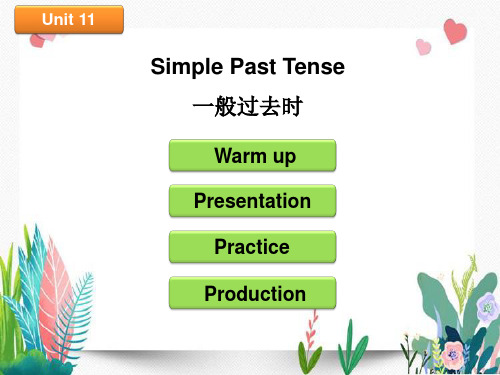
Presentation Sentences
一般过去时的主要用法和概念:一般过去时表示在过去某时 发生的动作或存在的状态,常与表示过去的时间状语 yesterday, last week, ago等连用。
一般过去时的用法: ① 表示过去时间里发生的动作或存在的状态,常与表示过去 的时间状语yesterday, last year, ago, the day before, yesterday, just now等连用。 ② 表示在过去一段时间里,经常性或习惯性的动作或状态, 常与always, often, usually等连用。
一般疑问句:a_t_t_h_e_l_iv_e__s_h_o_w_?_______________________ How many people were there at the
对划线部分提问:_l_iv_e__s_h_o_w_?________________________
Practice Oral Practice
Unit 11
Simple Past Tense 一般过去时
Warm up Presentation
Practice Production
Warm up
Free talking: What do you usually do on weekdays?
I usually get up at 6:00, I put on my clothes, make the bed, brush my teeth, wash my face. I have breakfast at 6:40, then wipe the table. I go to school at 8:00, and eat lunch at 12:00. Then I usually do my housework at 6:00, take a bath at 7:00, and watch TV at 7:45, and go to bed at 9:00.
小学英语过去式讲解(附练习及答案)
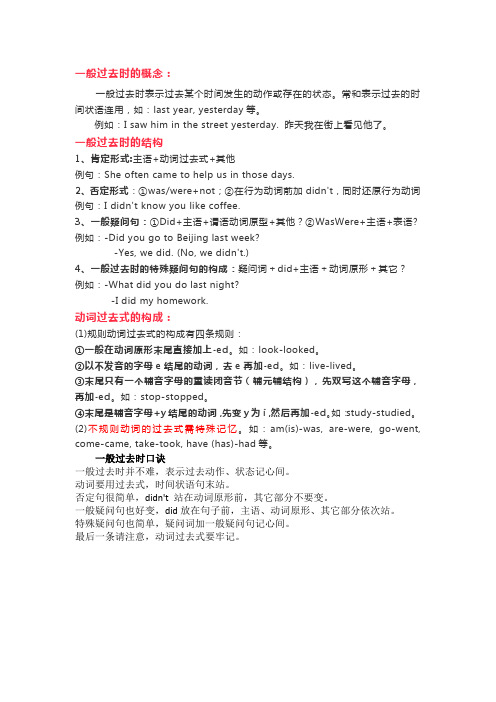
一般过去时的概念:一般过去时表示过去某个时间发生的动作或存在的状态。
常和表示过去的时间状语连用,如:last year, yesterday等。
例如:I saw him in the street yesterday. 昨天我在街上看见他了。
一般过去时的结构1、肯定形式:主语+动词过去式+其他例句:She often came to help us in those days.2、否定形式:①was/were+not;②在行为动词前加didn't,同时还原行为动词例句:I didn't know you like coffee.3、一般疑问句:①Did+主语+谓语动词原型+其他?②WasWere+主语+表语?例如:-Did you go to Beijing last week?-Yes, we did. (No, we didn't.)4、一般过去时的特殊疑问句的构成:疑问词+did+主语+动词原形+其它?例如:-What did you do last night?-I did my homework.动词过去式的构成:(1)规则动词过去式的构成有四条规则:①一般在动词原形末尾直接加上-ed。
如:look-looked。
②以不发音的字母e结尾的动词,去e再加-ed。
如:live-lived。
③末尾只有一个辅音字母的重读闭音节(辅元辅结构),先双写这个辅音字母,再加-ed。
如:stop-stopped。
④末尾是辅音字母+y结尾的动词,先变y为i,然后再加-ed。
如:study-studied。
(2)不规则动词的过去式需特殊记忆。
如:am(is)-was, are-were, go-went, come-came, take-took, have (has)-had等。
一般过去时口诀一般过去时并不难,表示过去动作、状态记心间。
动词要用过去式,时间状语句末站。
否定句很简单,didn't 站在动词原形前,其它部分不要变。
一般过去时_小学六年级英语
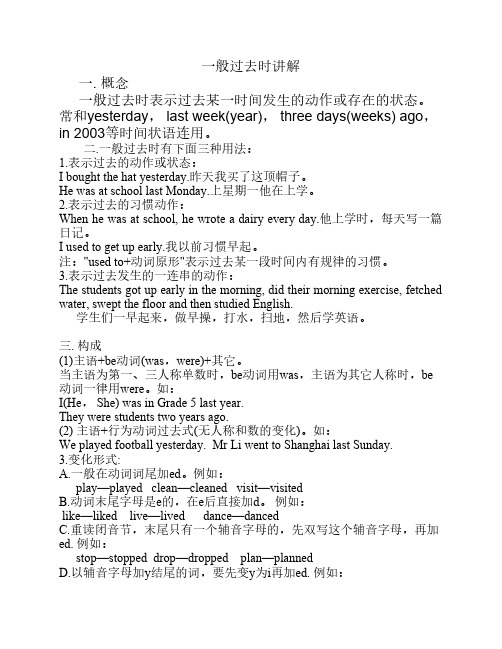
一般过去时讲解一. 概念一般过去时表示过去某一时间发生的动作或存在的状态。
常和yesterday, last week(year), three days(weeks) ago,in 2003等时间状语连用。
二.一般过去时有下面三种用法:1.表示过去的动作或状态:I bought the hat yesterday.昨天我买了这顶帽子。
He was at school last Monday.上星期一他在上学。
2.表示过去的习惯动作:When he was at school, he wrote a dairy every day.他上学时,每天写一篇日记。
I used to get up early.我以前习惯早起。
注:"used to+动词原形"表示过去某一段时间内有规律的习惯。
3.表示过去发生的一连串的动作:The students got up early in the morning, did their morning exercise, fetched water, swept the floor and then studied English.学生们一早起来,做早操,打水,扫地,然后学英语。
三. 构成(1)主语+be动词(was,were)+其它。
当主语为第一、三人称单数时,be动词用was,主语为其它人称时,be 动词一律用were。
如:I(He, She) was in Grade 5 last year.They were students two years ago.(2) 主语+行为动词过去式(无人称和数的变化)。
如:We played football yesterday. Mr Li went to Shanghai last Sunday.3.变化形式:A.一般在动词词尾加ed。
例如:play—played clean—cleaned visit—visitedB.动词末尾字母是e的,在e后直接加d。
小学英语语法-一般过去时(PPT)

动词原形、第三人称单数
动词过去式
got
played
did
They don’t watch TV in the evening. They _________ TV last night.
11. go 12. have 13. do 14.get 15. come 16. say 17.see 18. put 19. read 20.take
looked
bought
made
found
broke
thought
fell
wrote
was/were
sang
heard
Exercises
A. write B. writed C. wrote D. writing
1.I ____ the number down on a piece of paper a moment ago.
01
time night week month term Monday
yesterday
morning afternoon evening
the day before yesterday
2.与last 连用
3.与yesterday 连用:
last
与one 连用:
其他时间状语:
just now in the old days in those days in 1980 the other day at that time once upon a time
was , were
had
- 1、下载文档前请自行甄别文档内容的完整性,平台不提供额外的编辑、内容补充、找答案等附加服务。
- 2、"仅部分预览"的文档,不可在线预览部分如存在完整性等问题,可反馈申请退款(可完整预览的文档不适用该条件!)。
- 3、如文档侵犯您的权益,请联系客服反馈,我们会尽快为您处理(人工客服工作时间:9:00-18:30)。
5.小学阶段不规则动词一般过去时:
am/is—was
are—were
have/has—had do—did
sing—sang
sit—sat
give—gave
run—ran
come^ came
eat—ate
take—took
一般疑问句:Jim did homework yesterday.
―► Did Jim do homework yesterday?在句首加did,句子中的动词过去式变回原形)特殊疑问句:Jimdid homeworkyesterday.
Did Jimdo homeworkyesterday?
一►What did Jim do yesterday?(疑问词+—般疑问句?)
⑵句中没有be动词的一般过去时的句子
Jim does homework every day.
Jim did homework yesterday.
否定句:Jim did homework yesterday.
—* Jim did n't do homework yesterday.(did n't+动词原形)
write—wrote
ride—rode
drive—drove
speak—spoke
get—got
go—went
make—made
know—knew
see^ saw
teach—taught
buy—bought
read—read
put—put
hurt—hurt
cut—cut
fall—fellsay—said
如:I went to bed at eleven last night.昨晚我11:00睡觉。
2
1.一般在动词末尾加-ed,如:pull-pulled, cook-cooked, play- played
2.结尾是e加d,如:taste-tasted
3.末尾只有一个元音字母和一个辅音字母的重读闭音节,应双写末尾的辅音字母,再加-ed,女口:stop-stopped, plan-planned, prefer-preferred
A. Did, playedB.Did, playC.Did, plays
三、用单词的适当形式填空
1.He(be) in Wuxi two years ago.
2.She(read) a comic book last night.
3.We(have) a party last Christmas.
3
(1)Be动词在一般过去时中的变化
1)am和is在一般过去时中变为was。(was not=wasn't
2)are在一般过去时中变为were。(were not=weren't
3)带有was或were的句子,其否定、疑问的变化和is, am, are一样,即否定句在was或were后加not,—般疑问句把was或were调到句首。
4.We(go) hiking last Sunday.
5.I(make) a model ship with Mike yesterday.
6.They(play) chess in the classroom last PE lesson.
7.Rose(do) homework the day before yesterday.
A. isB. wasC. am
()5. Whatyou usually do on the weeke nd?
A. areB. doC. did
()6. Hehis gran dpare nts last Sun day.
A. visitB. visitedC. visits
()7. Where did you go?
8.What(do) you(do) two hours ago?
9.John was late for class this morning because he(get) up late.
10.The children(be) excited just now.
四、句型转换
1.Su Hai did his homework last night.
()8. -Did you play football? -- Yes. Ifootball.
A. playB.playsC.played
() 9.youto school last Sunday?
A. Did, comeB.Do, comeC.Were, come
() 10.hefootball last weekend?
否定句:
一般疑问句:
肯、否定回答:
2.Nancy went to school early this morning.
否定句:
一般疑问句:
肯、否定回答:
3.We sang some English songs.
否定句:
一般疑问句:
肯、否定回答:
4.Danny was in the library just now.
பைடு நூலகம்综合练习
、写出下列动词的一般过去时
is\am
study
pla nt
are
play
go
does
help
ask
watch
eat
put
read
make
have
do
has
come
sit
run
二、选择题
()1. Wean En glish play a mome nt ago.
A.seeB. seesC. saw
()2. Limi nglast Sun day morni ng.
A. cut hairB. cuts hairC. is cutt ing
()3. Hethe clothes yesterday.
A. did n'wash B. did n'washedC. don'washed
()4. Ita windy day yesterday.
★一般过去时
1
表示在过去某个时间里所发生的动作或存在的状态。通常在句子里找到表示过去时间的 词或词组。如:yesterday,yesterday morning/ evening,the day before yesterday(前天),last night/week/ month/year,just now(冈H才),two days ago,a week ago, in 1990等。
